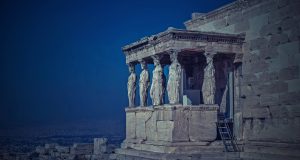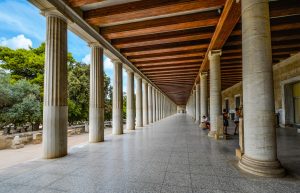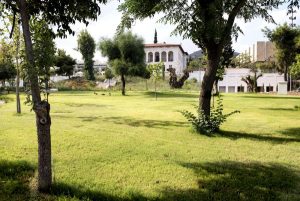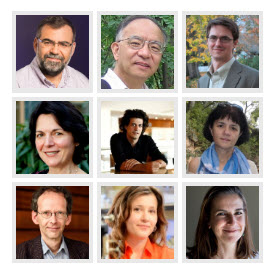Explore Athens
WHY ATHENS
 Surrounded by a lining of stunning coastline and mountains, Athens is filled with gems just waiting to be discovered. Located at the crossroads of three continents, the capital of Greece with an overall population of close to 4 million people has often been the melting pot of many cultures. Characterised by a culture and people that are welcoming and relaxed every visitor will feel like home.
Surrounded by a lining of stunning coastline and mountains, Athens is filled with gems just waiting to be discovered. Located at the crossroads of three continents, the capital of Greece with an overall population of close to 4 million people has often been the melting pot of many cultures. Characterised by a culture and people that are welcoming and relaxed every visitor will feel like home.
USEFUL LINKS AND GUIDES
Mobile Applications
- THE BEAT, an easy way to get a taxi wherever you are in Athens and reach your destination safely. Payments are made with card, no cash needed
- e-table, make reservations online and earn discounts
- Delivery.gr, choose the closest restaurant and order your need to find nearby, can be found on this app
- Clio muse, shares the best cultural stories for indoor and outdoors tours
- ATH Airport, is useful for checking your flight status, as well as any information that has to do with the Athens International Airport

Culture & Events
- Stavros Niarchos Cultural Center wide range of free events such as live music shows, exhibitions, astronomical observations, open air movie screenings, sports and activities, can be found here.
Highlight of this week:
Concert: On Saturday July 13, the mesmerizing voice of Madeleine Peyroux will fill the Great Lawn of the Stavros Niarchos Park, setting the stage for a dreamy and poetic evening under the stars (free entrance)
Photo Exhibition of Yannis Behrakis. A selection of seventy of the most powerful images of the Greek photojournalist, framed by videos of talks and interviews by Yannis Behrakis during his long-lasting photographic journey, expressing his most important thoughts on photography and the world.
- Athens Open Air Film Festival Distinctive monuments of Athens and touristic destinations host outdoors film screenings and concerts, free of charge.
- Athens Photo Festival 2019 The leading international festival of photography and visual culture in South-East Europe, and one of the five oldest of its kind in the world
- Eugenides Foundation Planetarium.
- Athens Epidaurus Festival 2019 Annual Cultural Festival around Greece, since 1955.
- Neon contemporary culture events and performances around Athens.
- Museum of Cycladic Art Exhibition “Picasso and Antiquity”
- Music concerts:
- TINDERSTICKS at Odeon of Herodes Atticus, Acropolis, 13 July 2019
- OMARA PORTUONDO at Technopolis, Gazi, 15 July 2019
- EJEKT FESTIVAL ATHENS featuring THE CURE at Plateia Nerou, 17 July 2019
- Open Air Cinemas: Cine Paris (22 Str. Kidathinaion str), Thision (7 Ap. Pavlou), Aigli (Zappeio Garden) Dexameni(Dexameni Square, Kolonaki), Cine Floisvos (Floisvos Marina), Cine Alimos (Alimos Marina)
- Day trip to the islands around Athens, such as Agistri (tickets), Spetses (tickets), Poros (tickets).
The city of Athens Cultural Network: http://www.athensculturenet.com/en
LANDMARKS

The establishment of Athens as a city dates back to mythological times. The city’s history is still evident throughout Athens in the form of many Ancient, Roman, Byzantine and modern monuments.
Today’s capital integrates the ancient and medieval history into the contemporary era. Monuments can be found all around the city center, side by side with contemporary constructions such as buildings, roads and train stations.
The Parthenon, a monument that constitutes the symbol of Greece worldwide, has been standing on the “sacred rock” of Athens, the Acropolis, for thousands of years. The Parthenon along with the other monuments of the Acropolis, are all excellent pieces of art, reflecting the Classical period and the Golden Age of ancient Athens in the 5th and 4th centuries B.C.
Designed by Bernard Tchumi in collaboration with Michalis Photiadis; the sparkling new museum, since its opening in June 2009, has already become the city’s top attraction and is expected to become one of the most visited and “must see” museums worldwide. The museum, which exhibits approximately 4.000 artefacts, allows the sculptures to be viewed in natural light, with special glass and climate-control measures, protecting them from sunlight. The most impressive part of the museum is its top floor, where visitors will be able to view the frieze and then look out of the windows to view the Parthenon itself.
At the footsteps of the Acropolis, the Odeon was built in 161 A.D. under Tiberius Claudius Atticus Herodes. To date concerts, plays and ballets have been performed. The natural setting of Herodeion, with its marvelous arcades, the Parthenon as a backdrop and the moon up in the sky will certainly fascinate you.
 The Ancient Agora, which means “market” in modern Greek, is situated at the footsteps of the Acropolis and in ancient times it served as the commercial centre of the city but also as a political, cultural and religious centre.
The Ancient Agora, which means “market” in modern Greek, is situated at the footsteps of the Acropolis and in ancient times it served as the commercial centre of the city but also as a political, cultural and religious centre.
Originally built in the 4th century B.C. for the athletic competitions of the Great Panathinaia (ancient Greek festivities), the “Kallimarmaron” Stadium (meaning “beautiful marble”) was the venue of the first modern Olympic Games, in 1896.
National Archaeological Museum of Athens
The National Archaeological Museum of Athens is the largest in Greece and one of the most important museums in the world devoted to ancient Greek art. It was founded at the end of the 19th century to house and protect antiquities from all over Greece, thus displaying their historical, cultural and artistic value.

The Byzantine and Christian Museum, which is based in Athens, is one of Greece’s national museums.
Its areas of competency are centred on – but not limited to – religious artefacts of the Early Christian, Byzantine, Medieval, post-Byzantine and later periods. The Museum has over 25.000 artifacts in its possession, which date from between the 3rd and 20th Century A.D.
The Museum of Cycladic Art is dedicated to the study and promotion of ancient cultures of the Aegean and Cyprus, with special emphasis on Cycladic Art of the 3rd millennium BC.
It was founded in 1986, to house the collection
of Nicholas and Dolly Goulandris, an extensive and unique private collection of prehistoric art from the Cycladic islands as well as ancient Greece.
The Benaki Museum ranks among the major institutions that have enriched the material assets of the Greek state. It houses
30.000 items illustrating the character of the Greek world through a spectacular historical panorama covering several periods
ranging from the Prehistoric, Ancient and Roman periods to the Byzantine and the contemporary Hellenic period.
Hellenic Cosmos Cultural Center of the Foundation of Hellenic World
A living museum, an ultramodern cultural center, where visitors can learn about history, culture and sciences through interactive exhibitions, educational programs, virtual reality shows and documentaries.

Useful Information
| Language | The native language of the population is Modern Greek. English is widely spoken as a second language by the majority of Greeks, while French and German are also spoken to a good extent. |
| Time | Greece is two hours ahead of Greenwich Mean Time, seven hours ahead of Eastern Standard Time and an hour ahead of Central European Time. |
| Health | Emergency treatment is free to all visitors in public hospitals. There are more doctors per person in Greece than in most other countries in the European Union. |
| Currency | Greece is a full member of the European Union since 1981, and its currency is the Euro (€). All major credit cards are widely accepted in Greece. |
| Visa information | Greece follows the Schengen Agreement provision and the subsequent acquis concerning short term visa issues stays up to three (3) months in the Schengen area. Holders of regular passports from the rest of the world need a visa in order to visit Greece (and the Schengen area). The local PCO will provide invitation letters to all participants for VISA purposes. |
Meet the Speakers

Contact Us
Reach out to us and we will respond as soon as possible.
You can send us an email to [email protected].
